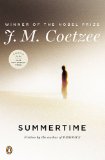Reading Guide Questions

Please be aware that this discussion guide will contain spoilers!
INTRODUCTION
With Summertime, Nobel Prize-winning novelist J. M. Coetzee has delivered one of the most profound and searching books of his extraordinary career—a meditation on identity and love, an unrelenting exploration of the personal and spiritual costs inherent in the making of art, and a cunning pseudo-autobiography.
Coetzee has a reputation as a bold and inventive novelist, and Summertime bears that out in its innovative structure. Rather than a straightforward narrative, the book comprises interviews conducted by Mr. Vincent, a fictional biographer who is writing a book about a deceased writer named John Coetzee. This meta-fictional framing device works brilliantly as Vincent’s successive interlocutors reveal their versions of the man at the center of the book and behind the book.
The portrait that emerges from these overlapping perceptions is often shockingly unflattering. The women characters are at times venomous in their contempt for Coetzee’s passivity and detachment. He is called “soft,” “radically incomplete,” “an irritation,” with “something cool or cold about him”; he “did not have a strong presence” and “wasn’t made for love.” When challenged to defend him, even Vincent can only offer weakly that he was “dogged” and “had a steady gaze.” Why, the reader asks, would the author go to such lengths to present such a negative picture? Is he being ruthlessly honest or is there some kind of game being played here? At the very least, a comical figure emerges. Awkward moments of physical and romantic ineptitude show that the author is capable, in his wry way, of laughing at himself even while contemplating mortality and the difficult question of whether we can ever truly know someone else.
DISCUSSION QUESTIONS
- What do you think about the structure of the novel? Do you believe it’s an effective way of telling this character’s story? Why do you think Coetzee, the author, chose to write the story in this way?
- How close do you think Coetzee the character is to Coetzee the author? Are we to read this as autobiography?
- Which of the five interviewees do you think knew Coetzee the best? Who had the most insight into the man?
- In the first interview, Julia Frankl tells Vincent that “if you go away from here and start fiddling with the text, the whole thing will turn to ash in your hands” (44). What does Julia’s statement say about the nature of biography? Can we ever really get the true story of someone’s life?
- What portrait of South Africa and Cape Town emerges from the interviews in this novel? How do you think the country itself had an effect on the character John Coetzee and on the interviewees?
- Julia says of Dusklands, Coetzee’s first work of fiction, that “I prefer my books to have proper heroes and heroines, characters you can admire” (56). What do you think about this? Do you like novels to contain characters that you like or do you find the flawed characters more compelling? Why?
- Adriana cannot believe that Coetzee was a great writer because “a talent for words is not enough if you want to be a great writer. You also have to be a great man” (195). Do you agree? What do you think she means by “a great man”?
- Martin is the only male interviewee. How does his testimony differ from the women’s? Why do you think the biographer included him in this project? Do you think that there’s a reason why he is the only one not identified by his full name?
- The ending of the book is pretty bleak. Coetzee must decide between devoting himself to nursing his father for the rest of the man’s life or abandoning him. Which do you think he will choose? Why? Could there be a third option, and what do you think that might be?
- Vincent is a shadowy presence throughout the book. What do we learn about him? Do you think his biography will be reliable? Do you think he has a tendency to lead his subjects?
Unless otherwise stated, this discussion guide is reprinted with the permission of Penguin Books.
Any page references refer to a USA edition of the book, usually the trade paperback version, and may vary in other editions.

 Book Reviewed by:
Book Reviewed by:



